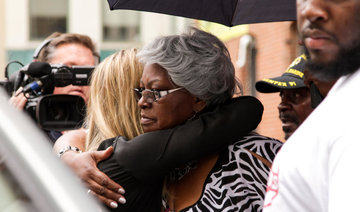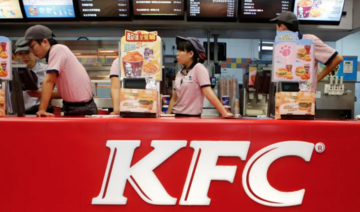CLEVELAND: There wasn’t much doubt in the minds of police in the Ohio village of Hartville, best known for its fertile muck farms, that Phil Snider killed his wife of 53 years.
But it took an undercover female officer who played her role so convincingly that the 73-year-old man proposed marriage over numerous cups of fast-food coffee and he revealed in gruesome detail how he had bludgeoned 70-year-old Roberta Snider to death and disposed of incriminating evidence.
Along the way, after his wife went missing in January, Snider spun different versions of what happened to her when questioned by police about how Roberta died and what happened to her body during what he initially said was a trip to Memphis to visit Elvis Presley’s Graceland.
The undercover officer surreptitiously recorded all of their meetings, including their final coffee date on April 20. Snider had offered marriage and the promise that she would receive his pension when he died. The officer said Snider would have to be honest about what happened to Roberta if he wanted their relationship to continue.
“Scenario-wise, if you hit her in the head, what did you hit her with?” the officer is heard asking Snider as they played cards at a McDonald’s.
“I can’t tell you that,” Snider replied.
“Why?“
“We aren’t married,” Snider said.
She continued pressing Snider for details, which he provided while punctuating most of the revelations with the words, “Just scenario.”
Snider, in the recording provided by police to media outlets, described how he gently placed a shop towel over his wife’s face as she slept on a love seat in the couple’s condominium and used a 2-pound hammer to kill her with two blows to the head. He said he wrapped her body in garbage bags and placed it along with blood-flecked evidence into plastic storage containers that he slid into the bed of his pickup truck.
Snider told the undercover officer he threw the hammer, a lampshade and two throw pillows from the love seat into commercial trash bins on the trip to Memphis.
Even now, what Snider did with his wife’s body is unclear. It’s the one detail Snider failed to tell his faux fiancee.
Snider agreed to take police to the spot where he discarded his wife’s body when he pleaded guilty Monday to aggravated murder, gross abuse of a corpse and tampering with evidence in northeast Ohio’s Stark County. Snider’s deal with prosecutors calls for a sentence of 20 years to life in prison.
Snider’s attorney declined to be interviewed.
Hartville police became involved when Roberta Snider’s brother asked for help Jan. 9, two days after Snider told some family members that Roberta had fatally choked on phlegm as they arrived in Memphis. Authorities say she was killed Jan. 3.
Snider initially told Hartville police the same story. He added that an ambulance responded to a hotel parking lot in Memphis where he told medics that he was taking her body home to be cremated.
No records of such a call were found.
When police, on Jan. 14, showed Snider surveillance photos from a hotel in Sparta, Kentucky, that did not include images of his wife, he changed his story and said she died between Columbus and Cincinnati and that he continued to Memphis with her body in the back of his truck because he wanted to see Graceland one last time. He said he threw her body into the Tennessee River from an interstate bridge on his way home. No body was found.
Police gathered more video, this time from an Ohio gas station where Snider filled up on his way to Memphis, showing only Snider in the cab of his truck. Before he could be questioned, Snider was found in the basement of his condo with a plastic bag over his head in what’s been described by authorities as a suicide attempt. He was taken to a hospital, where he remained for weeks.
The day after the suicide try, a cadaver dog hit on a large plastic tub in the basement of the couple’s condo. Inside was a swatch of Roberta’s favorite “Hartville, Ohio” sweat shirt that appeared to be blood-stained. Tests later matched the blood stains to Roberta. Confronted at the hospital, Snider provided yet another version of events. He said Roberta died at home and that he’d put her body in a garbage can.
The undercover officer charmed her way into Snider’s life after his release from the hospital, telling him she was in town to care for her dying mother. Hartville Police Chief Larry Dordea told The Associated Press the officer did a “great job” after sending her on what he called a “fishing expedition” to befriend Snider. Dordea wouldn’t provide any details about the officer.
Dordea said he interviewed Snider more than a dozen times before Snider’s April 20 arrest, describing the retired carpenter as “smug.”
There are only seven full-time officers in Hartville, an agricultural community of around 3,000 people about 50 miles southeast of Cleveland that’s known for its rich, black soil.
“We got to know each other pretty well,” Dordea said. “He was one of those individuals who felt he was smarter than the people he was talking to. Maybe he underestimated our law enforcement capacities here.”
Dordea believes Snider had thought about killing his wife for “a long time.” He said that although the couple was known to argue, police had never been called to their home.
In the recorded conversation, Snider tells the undercover officer: “I didn’t snap. I was numb.”
“And fed up,” the officer said.
“And fed up.”
Authorities owe it to Roberta Snider’s family and the Hartville community to find her body, Dordea said. He wouldn’t divulge the location Snider has provided, but said Snider will be riding with him on the trip there.
“Until we get there, we won’t know,” Dordea said. “Maybe there will be some enlightening conversations between here and there.”
Hinting marriage, undercover cop elicits slaying confession
Hinting marriage, undercover cop elicits slaying confession
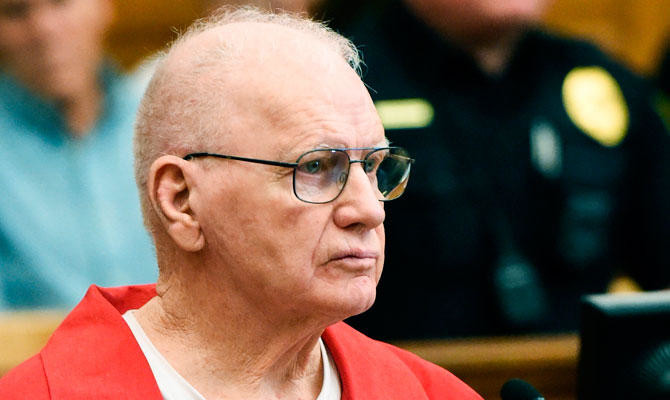
French barber still trimming at 90
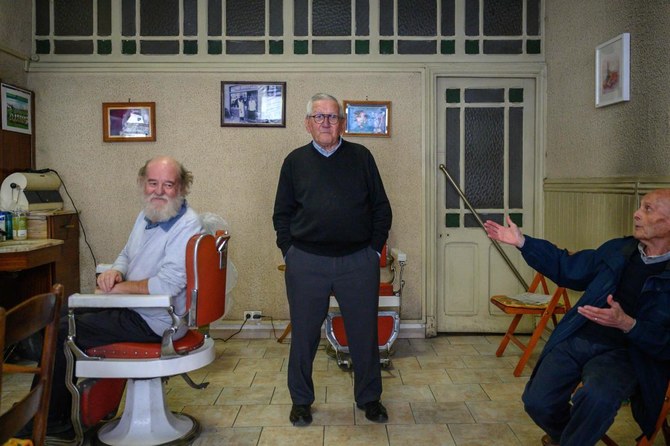
- “I love this job, it’s in my bones,” he said
- Even with arthritis, he is on his feet from Tuesday to Saturday, tending to his customers’ hair and beards in his shop in the small southern town of Saint-Girons
SAINT-GIRONS, France: French barber Roger Amilhastre, 90, could have hung up his clippers decades ago but he said his passion for hair gives him a reason to get up in the morning.
“I love this job, it’s in my bones,” he said, leaning on one of his cast-iron barber’s chairs from the 1940s.
“And despite my age, my hands still don’t shake.”
Even with arthritis, he is on his feet from Tuesday to Saturday, tending to his customers’ hair and beards in his shop in the small southern town of Saint-Girons in the foothills of the Pyrenees.
“I would have liked to retire at 60, but my wife was sick and I needed to pay for the care home,” he said, which cost more than 2,000 euros ($2,150) a month.
Even after his wife died in January, he kept going to work to stave off the sad thoughts.
“I’m not grumpy getting up” to go to work, he said.
France’s national hairdressers’ union believes Amilhastre may be France’s oldest active barber.
“We have a few who continue late in life, but 90 years old is exceptional,” union president Christophe Dore told AFP.
“I’m not sure if he is France’s oldest barber, but if not, he can’t be far off,” he added.
According to the national statistics institute INSEE, a little more than half a million people over 65 still work in France.
In the southern region of Occitanie, where Amilhastre lives, only 1.65 percent of people older than 70 years old still work, including 190 79-year-olds. But statistics do not go beyond that age.
Many of Amilhastre’s customers call him Achille, after his father who founded the barber’s shop in 1932, giving it his name and then teaching his son the profession.
The shop witnessed the German occupation of France during World War II.
“During the war, German police came to find my father to groom a captain who had broken his leg,” Amilhastre said.
German troops had taken over a large stately home in town called Beauregard.
“We were scared because they used to say that anyone who went up to Beauregard never came back,” he said.
“Luckily he did.”
The 90-year-old said he remembered a “tough period” for businesses when he first picked up the scissors in 1947 a few years after the war ended.
But then the town rebounded, he said, with its men following a flurry of new hair trends from greased back quiffs in the 1950s to 1970s bowl cuts.
The barber’s shop survived an economic downturn as local paper mills closed in the 1980s sparking mass layoffs, and supermarkets pushed small shops out of business.
“People started looking for work further afield, so we had to adapt and stay open later in the evening,” Amilhastre said.
That same decade, the AIDS epidemic sent customers into a worried frenzy.
“People were scared. They no longer asked to be shaved and when we did, we were petrified there’d be a cut, that someone would bleed and the virus would be passed on to the next customer,” he said.
Jean-Louis Surre, 67, runs the nearby cafe where Amilhastre once taught him to play billiards as a young boy.
Behind his bar, Surre said he still remembered his mother taking him across the road to see Amilhastre for a haircut every month as a child.
“He’d pump up the chair to reach the mirror, use his clippers and then at the end perfume you with some cologne — you know, squeezing those little pumps,” he said.
He is one of several old-timers to regularly drop by Achille’s — even just to read the newspaper or have a chat.
Inside the barber’s, Jean Laffitte, a balding 84-year-old, said he no longer really needed a haircut.
“With what little is left up there, these days I come out of friendship,” he said.
China’s Shenzhou-18 mission docks with space station

- The astronauts took off from the Jiuquan Satellite Launch Center in China’s northwest at 8:59 p.m. local time Thursday
- The astronauts will stay at the Tiangong space station for six months, carrying out experiments
JIUQUAN, China: A spaceship carrying three astronauts from China’s Shenzhou-18 mission safely docked at Tiangong space station Friday, state-run media reported, the latest step in Beijing’s space program that aims to send astronauts to the Moon by 2030.
The crew took off in a capsule atop a Long March-2F rocket from the Jiuquan Satellite Launch Center in China’s northwest at 8:59 p.m. local time 1259 GMT) Thursday.
By early Friday the spacecraft had “successfully docked” with the space station, state-run news agency Xinhua reported, citing the China Manned Space Agency.
The mission is led by Ye Guangfu, a fighter pilot and astronaut who was previously part of the Shenzhou-13 crew in 2021.
He is joined by astronauts Li Cong and Li Guangsu, who are heading into space for the first time.

Onlookers cheered as the rocket blasted off into the night sky, an AFP journalist at the scene said.
Xinhua said the launch had been declared a “complete success.”
The astronauts will stay at the Tiangong space station for six months.
There they plan to carry out experiments “in the fields of basic physics in microgravity, space material science, space life science, space medicine and space technology,” the China Manned Space Agency has said.
They will also try and create an aquarium onboard and seek to raise fish in zero gravity, according to Xinhua.
“Not only will the taikonauts find joy in the space ‘aquarium,’ but it may also pave the way for their future counterparts to enjoy nutritious fish from their own in-orbit harvests,” it added.

They will also conduct experiments on “fruit flies and mice,” a researcher quoted by the agency said.
The new crew will replace the Shenzhou-17 team, who were sent to the station in October.
Plans for China’s “space dream” have been put into overdrive under President Xi Jinping.
The world’s second-largest economy has pumped billions of dollars into its military-run space program in an effort to catch up with the United States and Russia.
Beijing also aims to send a crewed mission to the Moon by 2030, and plans to build a base on the lunar surface.
China has been effectively excluded from the International Space Station since 2011, when the United States banned NASA from engaging with the country — pushing Beijing to develop its own orbital outpost.
That station is the Tiangong, which means “heavenly palace” — the crown jewel of a space program that has landed robotic rovers on Mars and the Moon, and made China the third country to independently put humans in orbit.
It is constantly crewed by rotating teams of three astronauts, with construction completed in 2022.
The Tiangong is expected to remain in low Earth orbit at between 400 and 450 kilometers (250 and 280 miles) above the planet for at least 10 years.
Algeria’s first KFC restaurant reopens without logo following Gaza protests
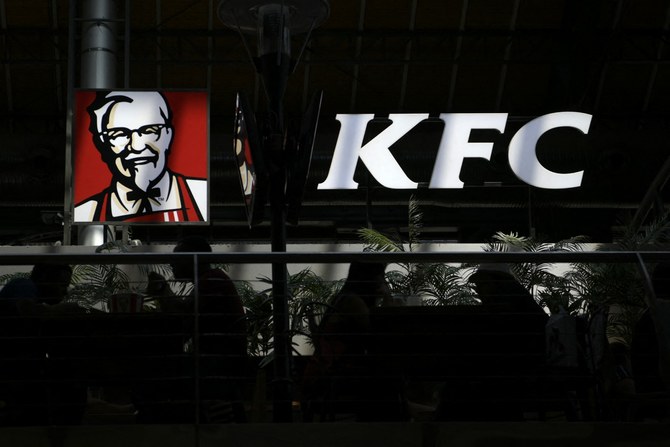
- Protesters gathered outside outlet last week in solidarity with Palestinians
- KFC parent company Yum! Brands has faced backlash for its ties with Israel
LONDON: Algeria’s first Kentucky Fried Chicken outlet has resumed operations after a temporary closure prompted by a series of pro-Palestinian demonstrations last week.
However, the restaurant, situated in the Algiers suburb of Dely Ibrahim, reopened its doors without the familiar Col. Sanders logo on its exterior.
It remains unclear if the outlet has had a change of ownership or remains under the umbrella of Yum! Brands, the parent company of KFC.
Demonstrators gathered outside the eatery on April 16, calling for a boycott and expressing solidarity with Palestinians amid the Gaza conflict.
Protesters draped in Palestinian flags voiced support for “Palestinian martyrs” while obstructing access to the storefront.
The restaurant has faced a backlash due to its perceived ties to Israel, with Yum! Brands having made investments in Israeli startups, including TicTuk, a company that allows customers to order food on social networks and message apps, and Dragontail, a system software company specializing in food processing.
In response, the Boycott, Divestment, Sanctions movement designated KFC’s sister company, Pizza Hut, as an “organic boycott target,” due to the “brands’ complicity in Israel’s genocide and apartheid against Palestinians.”
بعد أيام من افتتاح فرعها الأول، KFC الجزائر تزيل شعار علامتها وتُغلق أبوابها!
— أحمد داود (@AhmadDaoud14) April 17, 2024
منذ افتتاحها تعالت أصوات مقاطعتها، ووقفات احتجاجية أمامها، واستنكارٌ لمنح الترخيص لوكيلها! #الجزائر
pic.twitter.com/rIaOG80xTi
While the temporary closure of the KFC outlet was hailed as a success by demonstrators, its reopening sparked disappointment among some Algerians.
The incident underscores challenges and employment ramifications stemming from boycotts related to the Gaza conflict.
Since the start of the war, regional franchises of McDonald’s, one of the key boycotted brands, have distanced themselves from the parent company, arguing that they are 100 percent local.
The opening of a KFC branch in Algeria was noteworthy given the nation’s historical aversion to Western food chains, as well as its stringent foreign investment regulations, which typically prohibit the establishment of foreign food or beverage franchises.
Previous efforts to establish outlets without official approval, such as the brief appearance of a counterfeit “Starbucks,” have been met with swift action and closure.
Doner diplomacy: German president’s kebab trip to Turkiye sparks controversy

- German-Turkish say 60-kg kebab skewer brought from Germany in diplomatic mission reduces community’s contributions to stereotypical image
LONDON: German President Frank-Walter Steinmeier’s visit to Turkiye this week has stirred controversy after he brought along a 60-kg kebab skewer as part of his diplomatic mission.
Starting his three-day tour in Istanbul instead of Ankara, Steinmeier served kebabs at a reception, viewing it as a symbol of cultural exchange between the two nations.
“It is these special and intense relationships that bridge distances, and also some differences, today,” he said.
However, rather than emphasizing the close personal ties between Germans and Turks, the gesture drew criticism from many in the diaspora who viewed it as reducing their community’s contributions to a stereotypical image.
Germany, home to 2.7 million people of Turkish descent, welcomed hundreds of thousands of workers in the 1960s as part of its “guest worker” program, a bilateral agreement with Ankara to address labor shortages.
Turkish-Germans took to social media to condemn what they saw as a clumsy attempt to represent their community, accusing Steinmeier of failing to take them seriously or treat them as equals.
“Turkish-Germans discovered the 1st COVID vaccine in the world; some were movie directors who won awards on behalf of Germany, numerous writers, musicians, intellectuals from Turkey call Germany home,” wrote Evren Celik Wiltse, a professor of political science, on X.
“Of all of these, the (German) president chose the kebab maker to accompany him to (Turkiye)”, she added.
Turkish-Germans discovered the 1st COVID vaccine in the world; some were movie directors who won awards on behalf of Germany, numerous writers, musicians, intellectuals from Turkey call Germany home.
— Evren Celik Wiltse (@EvrenWiltse) April 22, 2024
Of all these, the president chose the kebab maker to accompany him to https://t.co/ZVMHyi48P0
Berkay Mandıracı, a senior analyst of Turkish-German heritage at the non-governmental organization Crisis Group, acknowledged that the gesture was well-intentioned but felt it was “anachronistic and reductionist.”
A well-intended gesture, I'm sure, but somehow not belonging to this age. As someone born and raised (until I was 12) in Germany, this feels anachronistic and reductionist.
— Berkay Mandıracı (@BerkayMANDIRACI) April 23, 2024
But let's not read too much into it and hope the rest of the visit will deepen Turkish-German ties https://t.co/ZjUvCLH7ES
The faux pas, which risked overshadowing the celebration of 100 years of diplomatic ties between the two nations, received the approval of Arif Keles, a third-generation kebab shop owner invited on the delegation trip by Steinmeier.
Keles, who served kebabs during the reception, described the opportunity as a “great honor.”
The dish of thinly sliced meat cooked on a vertical rotisserie was introduced to Germany by Turkish migrants.
Packed with chopped vegetables and doused with mayonnaise, the doner kebab has gained iconic status.
Local sales of the kebab total an estimated €7 billion ($7.5 billion), an immigrant success story the German presidency wanted to celebrate as an example of “how much Turkiye and Germany have grown together.”
Relations between Berlin and Ankara have been strained by various disputes, including disagreements over the Gaza conflict.
Steinmeier, visiting Turkiye for the first time since assuming office in 2017, has had a challenging relationship with Turkish President Recep Tayyip Erdogan, criticizing him for his approach to concerns about democratic norms in Turkiye.
Turkish-Germans have long spoken up about economic and social exclusion. Last year, Germany agreed to significantly ease citizenship rules to allow more dual nationals, a move welcomed by many Turkish individuals who have lived in Germany for decades.
With AFP
Controversy erupts as British MP Lee Anderson misses St. George’s Middle Eastern heritage

- The politician fails to acknowledge the patron saint of England’s connection to the Middle East in a video posted to celebrate St. George’s Day
LONDON: Reform UK MP Lee Anderson faced mockery after failing to acknowledge St. George’s historical ties to the Middle East in a recent social media post.
The former politician, who joined the far-right party after being suspended by the Conservatives for racist remarks about Mayor of London Sadiq Khan, shared a video on Tuesday commemorating St. George’s Day.
In it, Anderson proudly displayed red and white cufflinks matching the English flag. Also known as the St. George’s Cross, the symbol is historically associated with the Christian crusades.
“It’s St. George’s Day today and this country of ours has been a gift to the world,” Anderson said in the video.
In the accompanying caption, he wrote: “Trigger Warning. If you are a Guardian reading, advacado eating, Palestinian flag waving, Eddie Izzard supporting Vegan then this clip is probably not for your consumption.”
Anderson’s comments sparked amusement among users on X, where critics seized on his misspelling of “avocado” and highlighted the connection between Palestine and St. George, who is revered not only in England but also in parts of Africa, the Middle East, the Caucasus, and South America.
Comedian Shaparak Khorsandi quipped: “Who is going to tell him about St George’s connection to Palestine? (His mother was Palestinian, they too have a St. George’s day/feast. Though, to be fair, it is not known if he was related to Eddie Izzard),” referring to the actor/comedian.
Another user responded by sharing an image detailing facts about St. George, suggesting that if he were alive today, he would be considered an “immigrant” by Anderson’s standards, a group the Reform UK MP has repeatedly advocated should be deported.
Happy St George’s day. pic.twitter.com/Zq9cKGksOK
— GonePrivateIsh - still the same drivel (@Lairdysnr) April 23, 2024
Observed annually on the anniversary of St. George’s death with parades and marches, St. George’s Day was previously a national holiday and was once celebrated in England as widely as Christmas.
Born around AD 280 in what is now known as Cappadocia, Turkiye, St. George served as a soldier in the Roman army and fought in the crusade against Muslims. Beheaded in modern-day Palestine for refusing to renounce his Christian faith, St. George is revered by Christians, Druze and some Muslims as a martyr of monotheistic faith.
Renowned for his strength, courage and loyalty, St. George became a cherished figure in Europe and has been a symbol of English culture since the 14th century, despite never setting foot in the country.



